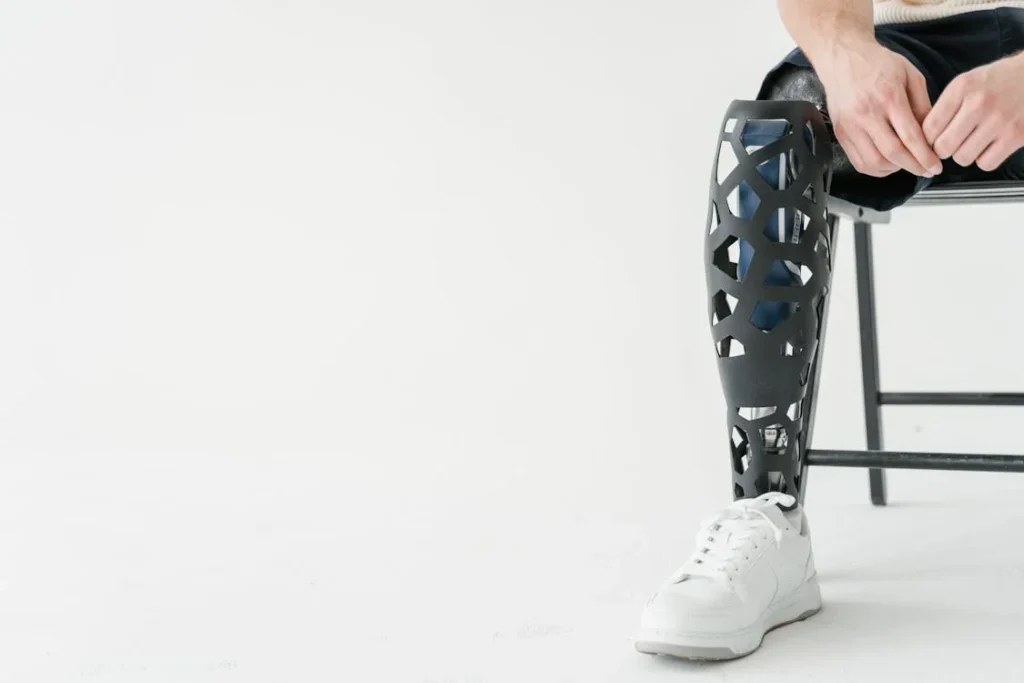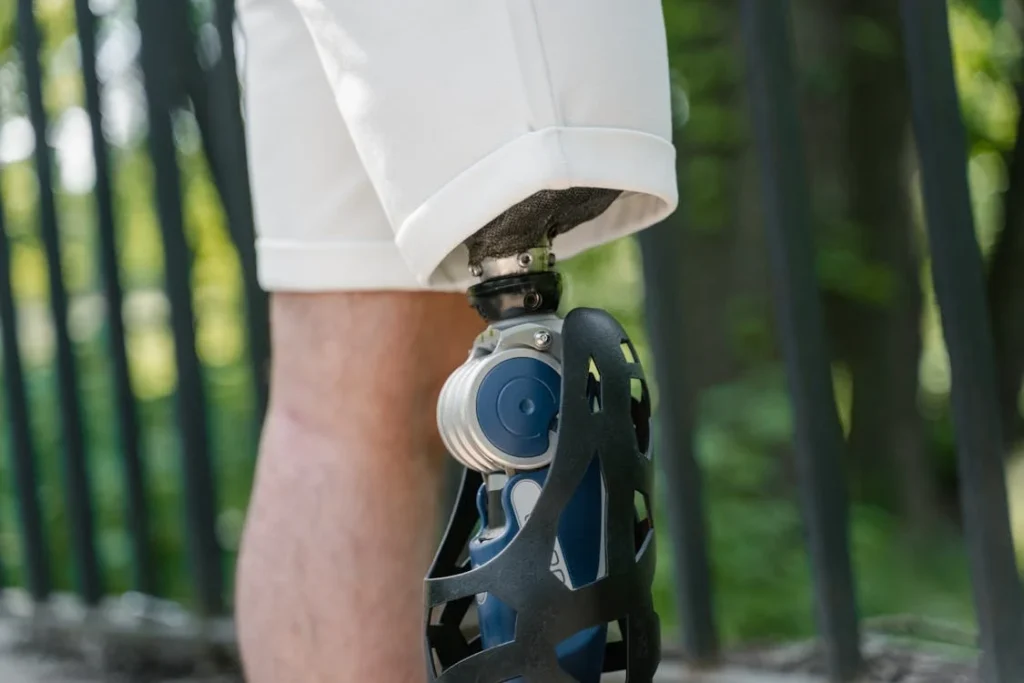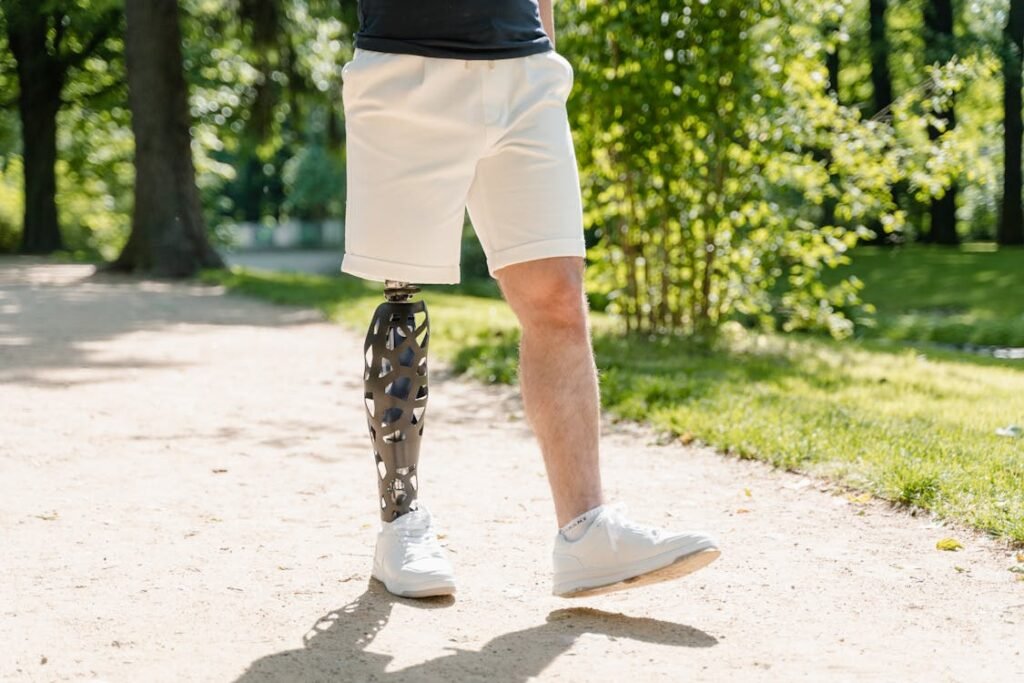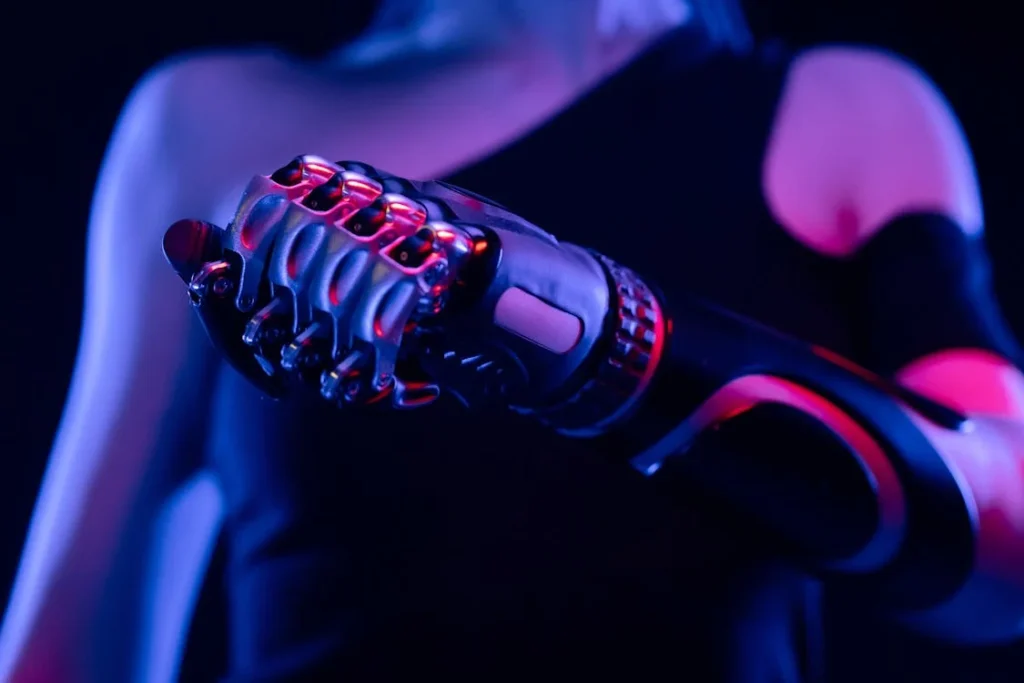For people with disabilities in India, getting a disability certificate is more than just paperwork—it’s a gateway to crucial benefits. Whether it’s financial assistance, job reservations, or access to advanced prosthetic devices, this certificate plays a key role in improving lives. Yet, many people either don’t know about it or find the process confusing.
If you or a loved one needs a prosthetic limb, having a disability certificate can make a big difference. It can help reduce costs, provide access to government schemes, and even open doors to free or subsidized prosthetic aid. However, navigating the process can feel overwhelming without the right guidance.

What is a Disability Certificate and Why is it Important?
A disability certificate is an official document issued by the government that verifies a person’s disability. It is essential for accessing various benefits, including free or subsidized prosthetic limbs, government support, and job reservations.
The certificate serves as proof of disability and is required for many legal and financial assistance programs in India.
For individuals in need of a prosthetic limb, this certificate can make a significant difference. The cost of advanced prosthetic devices, like bionic hands, can be high.
However, with the right certification, people can apply for financial aid, insurance support, and government schemes that help cover these expenses. It ensures that no one is left behind simply because they cannot afford the prosthetic aid they need to regain independence.
The government of India recognizes different types of disabilities, including locomotor disabilities, which include limb loss. Anyone with an amputation or a congenital limb deficiency can apply for the certificate.
Once issued, it grants access to various programs designed to improve mobility and quality of life.
Who Can Apply for a Disability Certificate?
Any Indian citizen with a medically diagnosed disability can apply for a disability certificate. The eligibility criteria vary based on the type and severity of the condition.
According to the Rights of Persons with Disabilities (RPwD) Act, 2016, a person is considered disabled if they have a minimum of 40% impairment in any recognized category of disability.
For individuals with limb loss or other physical disabilities, a qualified medical authority will assess the level of disability and determine whether they meet the required percentage.
The percentage is crucial because it determines eligibility for different benefits. Higher disability percentages often qualify for more extensive support.
Children born with limb differences, as well as individuals who have lost a limb due to accidents or medical conditions, are all eligible. The certification process takes into account functional limitations, ensuring that those in genuine need receive the required assistance.
How to Get a Disability Certificate in India
Applying for a disability certificate involves a step-by-step process that requires medical evaluation and approval from designated authorities. The first step is to visit a government-recognized hospital or medical board.
The applicant will undergo a thorough medical examination, where specialists assess the nature and extent of the disability.
The medical board consists of orthopedic specialists, physiotherapists, and other healthcare professionals who evaluate the applicant’s condition.
They check mobility, strength, and overall physical function to determine the appropriate disability percentage. The process might involve medical tests, X-rays, and a review of medical history.
Once the evaluation is complete, the medical board issues a disability certificate if the person meets the criteria. This document includes details such as the type of disability, percentage of impairment, and whether it is temporary or permanent.
Some conditions require periodic reassessment, while others qualify for a lifetime certificate.
After obtaining the certificate, applicants need to register with their district’s disability welfare office to access various benefits. The certificate can also be linked with Aadhaar for easier verification and access to government schemes.

How a Disability Certificate Helps in Getting Prosthetic Aid
A disability certificate is not just a document—it is a key that unlocks access to essential prosthetic aid and rehabilitation services.
Many people struggle to afford high-quality prosthetic limbs, especially advanced solutions like bionic hands or myoelectric prosthetics. However, with the right certification, they can benefit from government-funded programs, NGO assistance, and subsidized medical care.
One of the biggest advantages of having a disability certificate is financial support. The Indian government runs multiple schemes that help cover the cost of prosthetic limbs, making them more accessible to people who need them.
Institutions like the Artificial Limbs Manufacturing Corporation of India (ALIMCO) provide free or low-cost prosthetics to eligible individuals. Many state governments also have separate programs offering financial aid or insurance coverage for prosthetic limbs.
Apart from financial aid, the certificate ensures access to rehabilitation services, including physiotherapy and training to use a prosthetic limb effectively. Adapting to a prosthetic device requires guidance and practice.
Certified individuals can enroll in government-approved rehab centers or take advantage of home-based gamified rehabilitation programs like the ones offered by Robobionics. These programs help users build strength, coordination, and confidence in using their new limb.
Having a disability certificate also makes it easier to apply for assistive devices through CSR programs and charitable organizations.
Many private companies and NGOs distribute prosthetics through their corporate social responsibility initiatives, but they often require applicants to show proof of disability.
The certificate serves as verification, increasing the chances of receiving free or subsidized prosthetic solutions.
Government Schemes That Support Prosthetic Aid
In India, several government schemes provide assistance to people with disabilities, ensuring they receive the medical care and prosthetic devices they need.
One of the most well-known programs is the ADIP (Assistance to Disabled Persons for Purchase/Fitting of Aids and Appliances) Scheme. Under this initiative, eligible individuals can get prosthetic limbs and assistive devices at a highly subsidized cost or even free of charge.
Additionally, many states have their own disability welfare programs that cover the cost of mobility aids, including prosthetic hands, legs, and orthotic devices.
Beneficiaries can approach district disability welfare offices to learn more about the specific programs available in their region.
Another crucial benefit is priority access to medical care and rehabilitation services. Many government hospitals and institutions provide prosthetic fitting and training at little to no cost for certified individuals.
Some even collaborate with private manufacturers like Robobionics to offer state-of-the-art prosthetic solutions to beneficiaries.
Apart from prosthetic aid, people with a disability certificate can also apply for disability pensions, which provide financial support to cover medical expenses and daily needs. While the amount varies by state, this pension can help ease the financial burden of living with a disability.
How to Apply for Government Prosthetic Aid
The process of applying for government-sponsored prosthetic aid starts with obtaining a disability certificate. Once the certificate is issued, the individual must approach the nearest disability welfare office or government hospital that provides prosthetic services.
Applicants may need to submit additional documents, including income certificates, Aadhaar details, and medical prescriptions. In some cases, they may also need to undergo an additional assessment to determine the most suitable prosthetic device for their needs.
After approval, the prosthetic fitting process begins, followed by training and rehabilitation to help the individual adapt to their new limb.
Robobionics works closely with certified clinics and prosthetic centers across India to help individuals access affordable, high-quality prosthetic solutions.
Our flagship product, Grippy™, is a lightweight, ergonomic bionic hand designed to restore independence and confidence. With a disability certificate, users can explore financial aid options and get the best prosthetic technology without unnecessary financial strain.

Challenges in Obtaining a Disability Certificate and How to Overcome Them
Despite the many benefits of having a disability certificate, the process of obtaining one is often not as simple as it should be.
Many people face bureaucratic delays, lack of awareness, and inconsistent medical evaluations, making it frustrating and time-consuming. Understanding these challenges and knowing how to navigate them can make the process smoother.
One of the biggest issues is the lack of awareness. Many individuals, especially in rural areas, do not know that they are eligible for a disability certificate or how to apply for one. This leads to missed opportunities for financial aid and prosthetic assistance.
To overcome this, individuals should reach out to disability welfare offices, NGOs, or online portals like the Unique Disability ID (UDID) website, which provides step-by-step guidance on applying for a disability certificate.
Another common challenge is the lengthy approval process. Since multiple medical specialists need to verify the disability percentage, there are often delays in scheduling appointments and receiving the certificate.
Some hospitals also lack trained personnel or the necessary infrastructure to conduct proper disability assessments. To speed up the process, applicants should visit government-recognized hospitals that have dedicated disability assessment units.
Booking appointments in advance and ensuring all required medical documents are available can help avoid unnecessary delays.
Inconsistencies in medical evaluations can also create problems. In some cases, applicants with the same level of disability receive different percentage ratings based on the hospital or state they apply in.
This affects eligibility for benefits. To prevent such issues, it is advisable to consult multiple specialists and ensure the evaluation follows the guidelines of the Rights of Persons with Disabilities (RPwD) Act, 2016.
If an applicant feels their disability percentage has been unfairly assessed, they have the right to request a review or re-evaluation.
Corruption and red tape can sometimes create additional barriers. Some applicants have reported instances where officials demand bribes or unnecessary documents to process disability certificates.
The best way to counter this is by applying online through official government portals, where the process is more transparent and trackable.
Websites like Swavlamban (UDID portal) allow applicants to check the status of their application and receive updates without depending on intermediaries.
For individuals in urgent need of prosthetic aid, delays in obtaining a disability certificate can feel discouraging. However, organizations like Robobionics work closely with clinics and rehabilitation centers to provide immediate solutions.
Even if the certification process is still ongoing, we encourage individuals to reach out for a free consultation and explore their options for prosthetic assistance. Our goal is to ensure that no one is left without the mobility support they need while waiting for official paperwork.
The Role of Digitalization in Streamlining the Process
The Indian government has introduced digital solutions to make the disability certification process easier and more efficient. The Unique Disability ID (UDID) initiative is a major step toward reducing paperwork and improving access to disability-related benefits.
Once an individual is issued a UDID card, they no longer need to carry physical copies of their disability certificate. The card is linked to a central database, making verification and benefit application much smoother.
Applying for a UDID card is simple. Individuals can register online through the Swavlamban website, upload their medical documents, and track their application status in real-time.
The digital ID also ensures that individuals do not need to repeatedly apply for disability verification when seeking prosthetic aid or government assistance.
Robobionics supports the government’s push for digitalization and encourages all individuals with disabilities to apply for a UDID card. A single ID can unlock multiple benefits, making it a crucial step toward independent living.

The Impact of Disability Certification on Employment and Social Inclusion
A disability certificate does not just help in obtaining prosthetic aid—it also plays a critical role in employment, education, and social inclusion.
In India, individuals with disabilities often face challenges in securing jobs or pursuing higher education due to societal stigma and lack of proper support.
However, with a disability certificate, they become eligible for government job reservations, educational scholarships, and skill development programs, helping them lead independent and fulfilling lives.
One of the key benefits of a disability certificate is job reservation under the Persons with Disabilities (PwD) category. The Government of India mandates that 4% of government job vacancies be reserved for people with disabilities, including those with locomotor impairments.
This opens doors to stable career opportunities in both central and state government sectors. Many private companies also have inclusive hiring policies, where certified individuals are given priority for employment.
For those who have lost a limb due to an accident or medical condition, returning to work can feel overwhelming. However, with the right prosthetic aid and rehabilitation, many individuals regain full functionality and are able to continue working.
A disability certificate can help them apply for workplace accommodations, such as ergonomic adjustments, assistive devices, or modified workstations, ensuring that they can perform their job effectively.
Beyond employment, the certificate is essential for educational benefits. Many universities and colleges offer fee concessions, extended exam time, and specialized learning resources for students with disabilities.
Additionally, the government provides scholarships for students with disabilities, making higher education more accessible. For children and young adults who use prosthetic limbs, these benefits can significantly ease their academic journey.
Changing Perceptions and Building Confidence
One of the biggest challenges that individuals with disabilities face is social stigma. Many people still hold outdated beliefs about disability, which can lead to discrimination in workplaces, schools, and public spaces.
However, having a recognized disability certificate helps challenge these perceptions by providing official recognition of a person’s abilities and rights.
For individuals using prosthetic limbs, gaining social acceptance is an important step in their journey. A modern, high-functioning prosthetic hand, like Grippy™ by Robobionics, allows users to perform daily tasks with confidence, reducing dependence on others.
When combined with rehabilitation and skill development programs, prosthetic users can reintegrate into society more smoothly.
Organizations and advocacy groups are also working to create more inclusive public policies and accessibility standards. From ensuring better infrastructure for people with disabilities to promoting disability rights in workplaces, the landscape is slowly evolving.
The government’s initiatives, such as Accessible India (Sugamya Bharat Abhiyan), aim to make public spaces, transportation, and digital services more disability-friendly, ensuring greater participation in social and economic activities.
Robobionics is committed to empowering individuals with limb loss by not just providing high-quality prosthetic solutions, but also guiding them through the certification and rehabilitation process.
We believe that no one should feel excluded because of a disability. With the right tools, opportunities, and societal support, individuals with prosthetic limbs can lead fulfilling, independent lives.

The Future of Disability Certification and Prosthetic Aid in India
As technology and healthcare advance, the process of obtaining a disability certificate and accessing prosthetic aid is becoming more streamlined.
The Indian government is taking steps to make disability certification faster, more transparent, and universally accepted across states.
At the same time, innovations in prosthetic technology are making artificial limbs lighter, more functional, and more affordable, enabling people with disabilities to lead more active and independent lives.
One of the most promising developments is the integration of digital health records with disability certification. With the launch of the Unique Disability ID (UDID) initiative, individuals no longer have to carry physical documents to prove their disability.
This digital database ensures that government offices, hospitals, and employers can easily verify disability status, reducing the need for repeated medical evaluations.
The goal is to make disability benefits accessible with minimal bureaucracy, helping people receive support faster.
Another significant change is the expansion of financial aid programs for prosthetic users. The government is working to increase funding for prosthetic subsidies, skill development initiatives, and employment support.
This means that individuals with disabilities will have more opportunities to receive high-quality prosthetic devices at reduced or no cost.
More CSR initiatives from private companies are also stepping in to bridge the financial gap, ensuring that advanced prosthetic solutions reach those who need them the most.
How Prosthetic Technology is Changing Lives
Advancements in prosthetic technology are making artificial limbs more intelligent, responsive, and life-like. Traditional prosthetics were often heavy, uncomfortable, and limited in function.
However, new-age prosthetics, such as bionic hands with sensory feedback, allow users to experience a greater level of control and mobility.
At Robobionics, we are at the forefront of these innovations. Our Grippy™ bionic hand is designed to be affordable, lightweight, and intuitive to use, making it an excellent option for individuals who want a prosthetic that feels like a natural extension of their body.
With the help of gamified rehabilitation programs, users can quickly learn to adapt to their new limb, making daily tasks easier and improving their overall quality of life.
The future of prosthetic aid in India is also being shaped by 3D printing and AI-driven prosthetics. 3D printing technology allows for faster, cost-effective manufacturing of custom-fit prosthetic limbs.
AI-based prosthetics, on the other hand, use machine learning to understand a user’s movement patterns, allowing for more natural and adaptive control.
These innovations ensure that individuals with limb loss do not just receive a basic replacement, but a truly functional and empowering solution.

conclusion
While technological advancements and policy improvements are making life easier for people with disabilities, true inclusion requires a shift in mindset and societal attitudes. Disability should not be seen as a limitation but as a different way of experiencing the world. With better infrastructure, increased employment opportunities, and stronger advocacy for disability rights, India can move towards becoming a more inclusive nation.
Robobionics believes in a future where every individual with a disability has access to world-class prosthetic solutions without financial or bureaucratic barriers. This is why we work closely with government agencies, disability welfare organizations, and rehabilitation experts to ensure that our prosthetic users receive the best possible support.
If you or a loved one is considering a prosthetic limb, now is the time to explore your options. Book a free demo with Robobionics today and experience how Grippy™ can transform your life. If you haven’t applied for a disability certificate yet, take the first step today—it could open the door to a world of opportunities.



